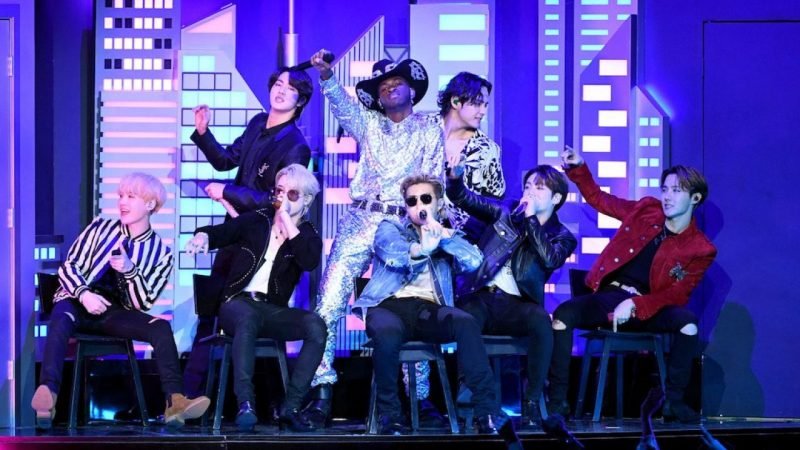Reinventing the K-Pop

An industry in full mutation
Korean pop or more commonly known as “K-Pop” is a musical genre that emerged in the early 1990s. It includes several types of music such as: “ballad, dance-pop, variety”.
As its name suggests, K-Pop comes straight from South Korea. It became very successful in Korea with the group Seo Taiji & Boys, known as the first South Korean idol group. Since then, a multi-billion dollar industry has emerged. In particular, thanks to video platforms and social networks, this musical genre has been able to make a name for itself through its musicality, choreography and the universe it has created around K-pop.
Today, this Korean universe is being exported from its peninsula and is enjoying widespread success in Europe and the United States. At the time, K-pop represented, for South Koreans, a return to a peaceful life without conflict. The classic development model of Korean pop is based on the artists’ performances and their ability to perform within the framework of Korean codes of beauty and dance. This creates a major misunderstanding for western fans in the explosion of K-pop, indeed an industry of humans with certain codes, certain well-oiled cogs that are to be respected to hear, if one wants to break through. A fact known globally but not taken into account is without a doubt the number of labels and groups founded per year. If we take the year 2013, among more than 300 bands only two will explode, BTS and Blackpink, each known to different measures, and with a different audience. Western fans are more used to artists with great moments of introspection, doubt and reflection. In France, one of the greatest singers of the music scene is undoubtedly Jack Brel, who when he learned he was ill went to the Marquesas Islands to reflect on his life, his work, his songs and his desires. He finally composed his last album there. The Korean fans also had changing demands, the public also changed, the age groups and sensitivities. They were also responding to society, to escape political, social and societal tensions. The expectations of the fans had to evolve, and a real process of studying the fanbase had to be created. The explosion of Korean culture in recent years shows that Europeans have clear expectations, but do not want the same codes as Koreans. One question that may come up is how to create a bridge between Korea and Europe even at the level of collaboration between artists. Some new labels, what we could call new-age labels, are trying to solve this kind of problem. The Korean pop music genre lends itself well to this kind of thing. Musical varieties such as ballads can be used as a medium for artists. The songs should reflect their emotions. The construction of a standard group is that each member is a component of that group, but they put aside the importance of the person as an individual. The challenge of labels today in terms of international relations is to keep this Korean identity but to expand into other regions, which will want to change their codes and mores.

Bad business
Rare are the industries without a dark spot on their board, the car industry is full of them, the American music industry as well and so on. The Korean pop industry is unfortunately not immune to this plague. Between sexual scandals that contrast with the image of perfection of the idols, scandals of the time when the Idols were unknown, and cyber-stalking by South Korean fanatics. There are all sorts of things, but public opinion often overlooks them. One day, a drama will thrill K-pop fans around the world, a drama that will be named after a K-pop idol: Jonghyun, whose real name is Kim Jong-hyun.
Around December 18, 2017, the K-pop world learned of the suicide of one of Korea’s most renowned pop singers. Some say that this event has not changed anything in the industry, others say that from now on agencies take care of their idols’ mental health, prevent cyberstalking, and put their singers’ careers on hold to avoid any drama.
Many people had strong proposals to “re-humanize” this industry, as French columnists could write at the time. No one thought that these scandals would develop a real anti-K-pop front, which generally turns out to be an anti-industry militia. It is certain that there have been abuses, but it is also clear that the answer is not the globalization of all artistic agencies, but a passage through education and new measures to be put in place should be prioritized to alleviate the new problems, notable exposure to social networks.
Interview with a player in this field
Let’s discover a company whose aim is to create and reinvent K-pop. We were able to ask questions and get answers about their objectives!
Let’s assume that there are people who have strong proposals to improve the protection of idols and the image of this industry. They will have to think about a new Korean pop industry or even more: reinventing K-pop. For this, the option of Americanization may be possible (i.e. advocating English lyrics in Korean songs).
But this does not rule out the possibility of losing the audience that gave Korean groups their first awards. The best thing would be to build a cultural bridge between Europe, the USA and South Korea.
This is the mission that two Frenchmen have set themselves. One of them with Korean origins will be able to pull out all the stops and prove that a revival of the Korean industry is possible. We contacted SG Entertainment, a company based in Seoul not far from Hongik University, which rivals the powerful Seoul National University. The co-founders agreed to answer our interview,
Here is the transcript of our exchange with Thomas Sommer, co-founder, CEO and CFO of SG Entertainment.
1) Can you introduce yourself and your company?
I am originally from Strasbourg and currently reside in Seoul, after having lived in Paris, Cambridge and Berlin. After my studies at Science-Po and ESSEC, I started working in finance before switching to startups. I first worked in the field of mobile applications and mobile advertising (adtech), before launching SG Entertainment with Joon-Hae. SG Entertainment is the first Korean entertainment company founded by French people. We are building a bridge between East and West by taking the concept of K-pop but bringing our European touch focused on creativity and expression of our own emotions.
2) On your trainee’s, is the objective to make a group for Korea or more widely for the international audience?
Our model, merging Korean and Western models, aims to create content with a universal scope. We create groups that are meant to become role models for the younger generation around the world.
3) In your interviews with the different presses, you explained that you were an art agency in the K-pop industry, but that your way of training is different, how is it different?
In the classic K-pop industry, everything is put into the training on the performance part of the idols: dancing, singing, and performing on camera. In the case of SG Entertainment, although these aspects are also crucial to the success of our artists, we place as much or more emphasis on their artistic training. More precisely, it is a question of teaching them to draw on their personal history, on their own emotions, the material that will serve to build their personality as an artist.
4) Can we say that the essence of your agency is the well-being of the trainee? What does this mean?
Absolutely. We look after their health, both physical and psychological. From a physical point of view, we make sure that they have a good diet (that they get the right nutrients and eat enough) and that they take it easy so that they don’t injure themselves during their training. From a psychological point of view, we mainly act on two axes: firstly, we establish a regular follow-up of our trainees’ health through discussion sessions with coaches. Secondly, within their training, we teach them to make a clear separation between their own personality, which belongs to them, and their public persona, in order to avoid them developing personality disorders (depression, anxiety, bipolarity) over time.
5) Do you have a different marketing strategy from other art agencies in the K-pop industry?
We have developed direct relationships with K-pop fan communities (fandoms) in order to conduct market research directly with the people involved. These relationships also allow us to test our concepts and promote our content directly to the fans.
6) In the future, do you want to diversify your strategy by developing other areas of activity or on the contrary, do you want to specialize in this field in a sustainable way?
In the future, we intend to create other types of content such as web dramas, TV series and feature films.
7) Do you think you want to become a reference in establishing a healthy working environment in the K-pop industry
We believe that operating in the entertainment sector with a clear policy in terms of our values around health and meeting basic human needs will give us a long-term competitive advantage.
In conclusion, we see that alternatives are possible, that they are being developed. SG Entertainment has a YouTube channel where trainees are asked to do different covers.
It’s these kinds of bold challenges with great personalities that will change this industry and build a following. The release of a band is planned for early 2022 or even 2023; in the meantime we encourage you to go to social networks or simply as before to the SG Entertainment website to follow all the adventures of the trainee’s (SG Entertainment (sg-ent.com). Our thanks go to the management of SG Entertainment who has taught us so much about their goals and the industry. We thank them and wish them a happy and prosperous future.


















